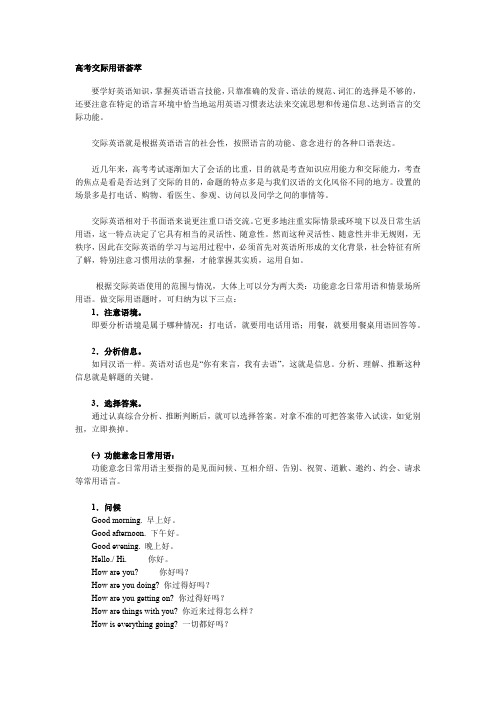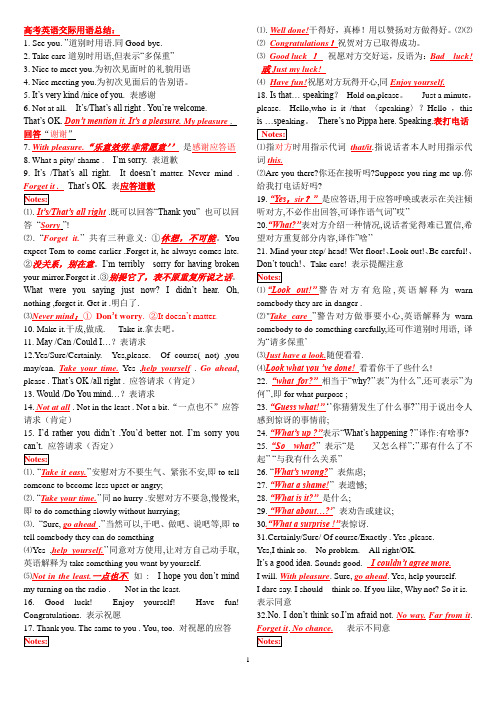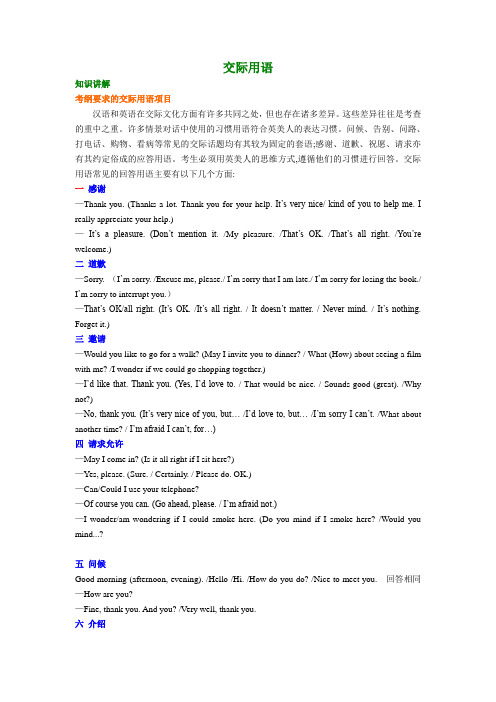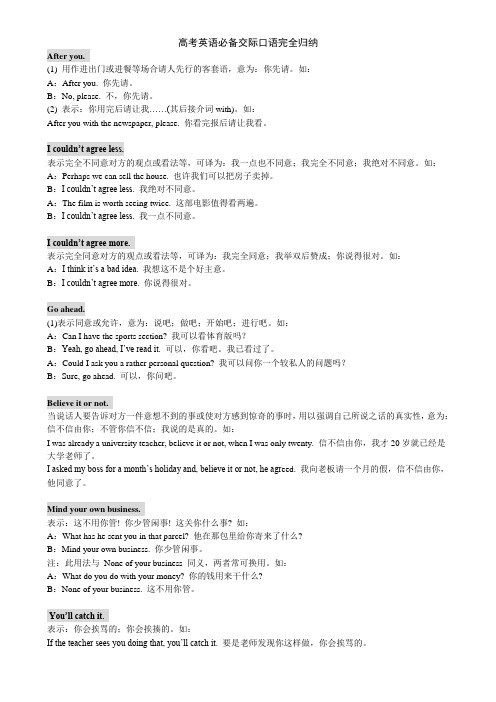我高考英语交际用语分类总结
- 格式:doc
- 大小:61.00 KB
- 文档页数:2

高考交际用语荟萃要学好英语知识,掌握英语语言技能,只靠准确的发音、语法的规范、词汇的选择是不够的,还要注意在特定的语言环境中恰当地运用英语习惯表达法来交流思想和传递信息、达到语言的交际功能。
交际英语就是根据英语语言的社会性,按照语言的功能、意念进行的各种口语表达。
近几年来,高考考试逐渐加大了会话的比重,目的就是考查知识应用能力和交际能力,考查的焦点是看是否达到了交际的目的,命题的特点多是与我们汉语的文化风俗不同的地方。
设置的场景多是打电话、购物、看医生、参观、访问以及同学之间的事情等。
交际英语相对于书面语来说更注重口语交流。
它更多地注重实际情景或环境下以及日常生活用语,这一特点决定了它具有相当的灵活性、随意性。
然而这种灵活性、随意性并非无规则,无秩序,因此在交际英语的学习与运用过程中,必须首先对英语所形成的文化背景,社会特征有所了解,特别注意习惯用法的掌握,才能掌握其实质,运用自如。
根据交际英语使用的范围与情况,大体上可以分为两大类:功能意念日常用语和情景场所用语。
做交际用语题时,可归纳为以下三点:1.注意语境。
即要分析语境是属于哪种情况:打电话,就要用电话用语;用餐,就要用餐桌用语回答等。
2.分析信息。
如同汉语一样。
英语对话也是“你有来言,我有去语”,这就是信息。
分析、理解、推断这种信息就是解题的关键。
3.选择答案。
通过认真综合分析、推断判断后,就可以选择答案。
对拿不准的可把答案带入试读,如觉别扭,立即换掉。
㈠功能意念日常用语:功能意念日常用语主要指的是见面问候、互相介绍、告别、祝贺、道歉、邀约、约会、请求等常用语言。
1.问候Good morning. 早上好。
Good afternoon. 下午好。
Good evening. 晚上好。
Hello./ Hi.你好。
How are you?你好吗?How are you doing? 你过得好吗?How are you getting on? 你过得好吗?How are things with you? 你近来过得怎么样?How is everything going? 一切都好吗?如:①Hello, Jack. Haven’t seen you for a long time/a ges! How’s everything going?你好,杰克。

高考英语交际用语总结:1. See you. ”道别时用语.同Good-bye.2. Take care道别时用语,但表示“多保重”3. Nice to meet you.为初次见面时的礼貌用语4. Nice meeting you.为初次见面后的告别语。
5. It‟s very kind /nice of you.表感谢6. Not at all. It‟s/That‟s all right .You‟re welcome.That‟s OK.Don’t mention it. It’s a pleasure. My pleasure . 回答“谢谢”7. With pleasure.“乐意效劳,非常愿意’’是感谢应答语8. What a pity/ shame . I‟m sorry.表道歉9. It‟s /That‟s all right. It doesn‟t matter. Never mind .That‟s OK.表应答道歉⑴. It’s/That’s all right.既可以回答“Thank you” 也可以回答“Sorry”!⑵. “Forget it.‟‟ 共有三种意义: ①休想,不可能。
You expect Tom to come earlier .Forget it, he always comes late.②没关系,别在意。
I‟m terribly sorry for having broken your mirror.Forget it .③别提它了,表不原重复所说之话。
What were you saying just now? I didn‟t hear. Oh, nothing ,forget it. Get it .明白了.⑶Never mind:①Don’t worry. ②It doesn‟t matter.10. Make it.干成,做成. Take it.拿去吧。

交际用语知识讲解考纲要求的交际用语项目汉语和英语在交际文化方面有许多共同之处,但也存在诸多差异。
这些差异往往是考查的重中之重。
许多情景对话中使用的习惯用语符合英美人的表达习惯。
问候、告别、问路、打电话、购物、看病等常见的交际话题均有其较为固定的套语;感谢、道歉、祝愿、请求亦有其约定俗成的应答用语。
考生必须用英美人的思维方式,遵循他们的习惯进行回答。
交际用语常见的回答用语主要有以下几个方面:一感谢—Thank you. (Thanks a lot. Thank you for your hel p. It’s very nice/ kind of you to help me. I really appreciate your help.)—It’s a pleasure. (Don’t mention it. /My pleasure. /That’s OK. /That’s all right. /You’re welcome.)二道歉—Sorry. (I’m sorry. /Excuse me, please./ I’m sorry that I am late./ I’m sorry for losing the book./ I’m sorry to interrupt you.)—That’s OK/all right. (It’s OK. /It’s all right./ It doesn’t matter. / Never mind. / It’s nothing. Forget it.)三邀请—Would you like to go for a walk? (May I invite you to dinner? / What (How) about seeing a film with me? /I wonder if we could go shopping together.)—I’d like that. Thank you. (Yes, I’d love to. / That would be nice. / Sounds good (great). /Why not?)—No, thank you. (It’s very nice of you, but… /I’d love to, but… /I’m sorry I can’t. /What about another time? / I’m afraid I can’t, for…)四请求允许—May I come in? (Is it all right if I sit here?)—Yes, please. (Sure. / Certainly. / Please do. OK.)—Can/Could I use your telephone?—Of course you can. (Go ahead, please. / I’m afraid not.)—I wonder/am wondering if I could smoke here. (Do you mind if I smoke here? /Would you mind...?五问候Good morning (afternoon, evening). /Hello /Hi. /How do you do? /Nice to meet you. 回答相同—How are you?—Fine, thank you. And you? /Very well, thank you.六介绍This is Mr. (Mrs. /Miss)... / I’d like you to meet my parents. /My name is....I’m a student.七告别Goodbye. /See you later (tomorrow). /Good night.八祝愿、祝贺和应答—Good luck!/ Best wishes to you. /Have a nice (good) time (journey). /Congratulations! —Thank you.—Happy New Year!/ Merry Christmas!—The same to you.—Happy birthday to you.—Thank you.九遗憾和同情What a pity! /I’m sorry to hear that.十提供帮助和应答Can I help you? / What can I do for you? /Here, take this/my bike.—Let me do it for you.—Thanks for your help. /Yes, please. /No, thanks. /That’s v ery kind of you.十一表示同意和不同意Certainly. /Sure. /Of course. /Yes, please. /Yes, I think so. /All right. /OK. /That’s a good idea. /I agree with you.No, I don’t think so. /I’m afraid not. / I really can’t agree with you.十二表示肯定和不肯定I’m sure. /I’m sure that...I’m not sure. /I’m not sure whether (if)... /Maybe.十三喜欢和厌恶I like (love)... very much. / I like (love) to...I don’t like to... /I hate to ...十四问时间、日期的应答—What day is it?—It’s Monday.—What’s the date?—It’s Jan. 10th.—What’s the time, please?—It’s five o’clock (half past five)... /It’s time to ...十五请求Can (could) you...for me? /Will (would) you please do sth.? /May I have...? /Please give (pass) me...十六劝告和建议I think you ought to…If I were you, I’d…It might be a good idea if you…Have you ever thought of…?I recommend that…I strongly advise you to…You really ought to…Personally, I think you’d better…Why not do…?Why don’t you do…?I suggest that…What about doing…?How about doing…?Shall we…?Let’s…, shall we?十七You need (to)…禁止和警告You can’t…You mustn’t…You’d better not…Don’t…Take care!Be careful!Look out!If you…, you will…You are not allowed to…十八打电话This is…(speaking). (一般不说I am…)It is …here.May (Can / Could) I speak to …, please?I’d like to speak to…, please. 请找…接电话好吗?Who’s that (speaking /calling)? (不说Who are you?)Is that … (speaking)?Is …there?Is…in?Hold on, please.Hold the line, please.Can I take a message? / Can you give (leave) a message? (对方要找的人不在时)Can/Could I ask who is calling?May I have your telephone number?十九购物What can I do for you? Can I help you?What’s the price of …? / How much is…? …多少钱?It’s well worth the money.Have you got anything a little cheaper?How much does it come to? /How much is it altogether?Try it for size.Will you show me…?Have you got any…?It’s a bit too large (small, plain. gaudy etc.) for me.That’s fine. I’ll take it.That’s too expensive, I’m afraid.What color do you want?What size do you want?Do you have any other kind?I’d like…/I want…二十问路和应答Excuse me. Where’s …? / Excuse me. Can you tell me the way to…? / How can I get to…?Go down this street.Turn right at the first crossing.Turn left at the second crossing.It’s about…metres from here.It’s only a ten-minute walk from here.Go straight ahead till you see…二十一就餐What would you like (to have)? /Would you like something to eat? / Would you like something to drink?I’d like…Would you like some more?Make yourself at home.It’s nic e/ delicious/ unusual.Help yourself to…Just a little, please.I’m full, thank you. /No more, thank you. /No, thank you. / No, I enjoyed it very much, but I won’t have any more.Do you take salt, or pepper?二十二看病医生用语:What’s wrong with you? /What’s the matter with you? /What’s your trouble?Is there anything wrong with you?Let me examine you.Does it hurt here?Take it easy. It’s nothing serious.You’d better have a good rest.Take this medicine three times a day.I advise you to give up smoking and not to drink too much.You’ll have to have an X-ray/CT examination.You’ll have to have chemical examination.You need have an injection.You’ll be well/ all right soon.病人用语:I have got a pain here. This place hurts.There is something wrong with my back/ leg/ arm.I’ve got a cough/ headache/ toothache/ stomachache/ fever.I feel bad/ terrible/ sick today.I don’t feel well/ all right today.Do I have to stay in hospital?二十三谈论天气What’s the weather like today?How is the weather i n…?What’s the weather going to be like at the weekend?It’s fine. /It’s cloudy. /It’s windy. / It’s rainy.It’s rather warm today, isn’t it?二十四语言困难Pardon? / Please say that again. /Would you please say that again? 请你再说一遍好吗?Would you please say that more slowly? / Please say that more slowly.What do you mean by…?I’m sorry I can’t follow you.I’m sorry I know only a little English.二十五祝酒用语Let’s drink to… /I now propose a toast to… /I’d like to propose a toast to… /cheers需要特别注意的交际用语Not a clue. 一点也不知道。

高考英语必备交际口语完全归纳After you.(1) 用作进出门或进餐等场合请人先行的客套语,意为:你先请。
如:A:After you. 你先请。
B:No, please. 不,你先请。
(2) 表示:你用完后请让我……(其后接介词with)。
如:After you with the newspaper, please. 你看完报后请让我看。
I couldn’t agree less.表示完全不同意对方的观点或看法等,可译为:我一点也不同意;我完全不同意;我绝对不同意。
如:A:Perhaps we can sell the house. 也许我们可以把房子卖掉。
B:I couldn’t agree less. 我绝对不同意。
A:The film is worth seeing twice. 这部电影值得看两遍。
B:I couldn’t agree less. 我一点不同意。
I couldn’t agree more.表示完全同意对方的观点或看法等,可译为:我完全同意;我举双后赞成;你说得很对。
如:A:I think it’s a bad idea. 我想这不是个好主意。
B:I couldn’t agree more. 你说得很对。
Go ahead.(1)表示同意或允许,意为:说吧;做吧;开始吧;进行吧。
如:A:Can I have the sports section? 我可以看体育版吗?B:Yeah, go ahead, I’ve read it. 可以,你看吧。
我已看过了。
A:Could I ask you a rather personal question? 我可以问你一个较私人的问题吗?B:Sure, go ahead. 可以,你问吧。
Believe it or not.当说话人要告诉对方一件意想不到的事或使对方感到惊奇的事时,用以强调自己所说之话的真实性,意为:信不信由你;不管你信不信;我说的是真的。

交际用语易错常考的日常交际用语1. 问候和应答A: How are you doing? B: Fine, thank you. / Just so-so.A: Please remember me to your parents. B: Sure, I will.2. 介绍和应答A: This is Mr./ Mrs./ Miss/ Ms Brown. B: Hello!/ How do you do ?/ Nice to meet you!3. 告别See you (later)! / Good night!( cf. Good evening!)/ Nice seeing you.4. 感谢和应答A: Many thanks!/ Thanks for your help!/ I appreciate your help!B: That’s all right (OK). / You are welcome./ Don’t mention it./ It’s a pleasure./ My pleasure.(cf. With pleasure. 用于回答对方的求助、邀请)5. 道歉和应答A: I’ m sorry.B: That’s all right (OK.). / It doesn’t matter./ Never mind./ That’s nothing./ Forget it.6. 邀请和应答A: Would you like to...?B: Yes, I'd love to. / Yes, with pleasure./ Yes, it's very kind ( nice )of you. / I'd love to, but I have other plans.7. 请求允许和应答A: Could I smoke here? / I wonder if I could smoke here.B: Yes (Certainly). / Yes, do please. / Of course you may. / That's OK (all right). / I'm sorry, but it is not allowed / You'd better not.A: Do you mind if I open the window?B: Not at all./ Of course not./ Certainly not./ I’m sorry, but you’d better not.8. 祝愿、祝贺和应答A: Good luck! / Best wishes to you. / Have a nice / good time. / Congratulations! / Have a good journey.!B: Thank you.A: Happy New Year! / Merry Christmas! / Happy birthday to you.B: The same to you.9. 提供帮助和应答A: Can I help you? / Would you like some help?B: Thanks. That would be nice / Yes, please. / No, thank you all (just) the same. / No, thank you anyway./ That's very kind of you, but I can manage it myself.A: What can I do for you? B: I’d like to go to the No. 3 Middle School.10. 约会A: Shall we meet at 4:30 ? / Let’s make it 4:00. B: All right. See you then.11. 打电话A: Hello! May I speak to Tom? B: Hold on, please.A: Is that Mary speaking? B: She isn't here right now. Can I take a message for you?12.就餐A: Would you like some more meat? / Help yourself to some more meat.B: Thank you. I've had enough. / Just a little, please.13. 看病A: What’s the matter? / What seems to be the trouble?B: I don’t feel like eating./ I've got a cough. / I feel terrible (bad). / I don't feel well. / I've got a pain here. / It hurts here.14.购物A: What can I do for you? / May (Can I )help you? B: I'd like to buy a dictionary.A: How about this one? B: That's fine. I'll take it.15. 问路和应答A: Excuse me. Where's the washroom? / Excuse me, can you tell me the way to the post office?B: Go down this street. Turn right / left at the second crossing.Sorry, I don’t know. I am a stranger here.16. 谈论天气A: What's the weather like today? / How's the weather in Beijing?B: It's fine / cloudy / windy / rainy, etc. / It's rather warm (cold / hot). today, isn't it?17. 处理交际中的障碍Pardon.! / I beg your pardon. / Please say that again( more slowly.) What do you mean by…. ? / I'm sorry I can't follow you.18. 提醒注意You can’t ( mustn’t) smoke here. / No smoking!/ Wet paint!/ Mind your head (step) /Take care!/ Be careful!/ Look out!19. 同意和不同意Certainly / Sure / Of course. / Yes, please. / That's a good idea. / I agreeNo, I don't think so. / I'm afraid not. / I really can't agree with you. / No way (决不,没门)20 时间或日期和应答A: What time is it now? / What's the time? B: It's about three.A: What day is it today? B: It's Wednesday.A: Excuse me. Have you got the time? B: Yes, it's six twenty.【各个击破】1. –I expect everything will turn out as you wish.---_____.A. All rightB. The same to youC. No, thanksD. I’d like to2. ---I’m sorry that I can’t attend your wedding.---_____? Haven’t we agreed on it?A. What is itB. Why don’t youC. What do you thinkD. How is it3 ---Excuse me, sir. I’m writing a rese arch paper on Chinese medicine. Do you mind answering afew question?----______.A. Yes, pleaseB. No, of course notC. CertainlyD. By all means4. ----Excuse me, could you tell me the time?----Sorry, I don’t have my watch with me.---_____A. Thanks anywayB. Thanks a lotC. I’m sorry to hear thatD. What a pity5. ----Would you like another cup of tea?----____.A. Why notB. Make yourself at homeC. Oh, sorryD. It’s very kind of you6. –I wish you wouldn’t have your TV so loud.---____. Were you trying to sleep?A. That’s all rightB. OKC. SorryD. Thank you7. ----How is everything, Rose?---____.A. Very well, thank youB. Not too badC. I’m all right, thanksD. Not at all8. ---Why didn’t you tell Ann the truth?---_____.A. Yes, I was afraid to be scolded by herB. No, but I wanted toC. But I didD. I always hate telling lies9. ---Not all present would believe what the report said, I’m afraid.---____.A. So do IB. Nor am IC. I agreeD. I’m afraid , too10. ---Here you are at last!--____.A. Are you all rightB. Yes, I’m hereC. Sorry to have kept you waitingD. You are here, too11. ---Please excuse me, but I really have to be going.---Yes, of course. ____.A. The same to meB. That’s OKC. Thanks a lotD. Nice seeing you.12. ---Tom , would you like to come to our dinner party?---_____.A. Yes, I wouldB. Yes, with pleasureC. No, I can’t comeD. Sure, it’s my pleasure13. ---___---Thank you. I certainly will.A. I wish you successB. Will you help me with my workC. Please remember me to your familyD. May I help you?14. ---______at the new school?---Fine. I’ve got used to the life there and I’ve made some friend.A.How are youB. How are you doingC. Are you getting on wellD. How do you do15.---Cliff, I lost your bike at school. I suppose I should pay for it.---Oh, ____. It was an old bike anyway.A. Forget itB. Take it easyC. OKD. Don’t say so16. ---Mum, I’ve cut my finger. It’s bleeding.---Oh, dear. ___.A.Let me seeB. Don’t worryC. Nothing wrongD. Take it easy17.–I’m going to travel to America. Would you tell me something about your ex periences there ?--___. Let’s discuss it over dinner.A. That’s all rightB. By all meansC. Go aheadD. It just depends18.---Shall I help you with the suitcase?---_____.A.It’s all right, thanksB. Yes, go ahead pleaseC. I d on’t want to trouble you too muchD. No, please don’t do it19. –You can’t finish the book in less than an hour, I suppose?--____.A.Yes, I’m sure I canB. No, hardlyC. Sorry, I can’tD. I don’t think I can20. –How are things going with you?--____.A. Quite well, thank youB. Good. And you?C. Good. Why not?D. No, just so-so.。

高考常考五类情景交际用语总结一、“没关系;不要紧;没问题;别提了…”类⒈ Never mind意为“没关系;不要紧;不用费事”,常用于以下几种场合:1)当别人向你致歉时;2)请对方放心或安慰对方时注意:由于受字面意思的影响,很多学生把Never mind用于对Do\Would you mind…的否定回答。
对Do\Would you mind…表示“不介意”时常用No, not at all;of course not;certainly not;No, please;No,go ahead等;表示“介意”的回答为You had better not;You’d rather not;I’m afraid…not;I’m sorry,but…等。
⒉Forget it 意为“没关系;不要紧;别提了”,通常用于以下场合:1)当别人向你致歉时;2)不同意对方要求的委婉拒绝⒊No problem意为“没问题;成”。
通常用于对别人的请求表示同意。
类似的表达还有:All right;OK。
⒋It doesn’t matter相当于No matter,意为“没关系;不要紧”,通常用于对别人道歉的答语。
二、pleasure类⒈It’s a pleasure to do …意为“很高兴做…”,相当于Pleased\Nice\Glad to do。
⒉It’s a pleasure=A pleasure=My pleasure,意为“不用谢;没关系;这是我乐意做的”,通常是对thank you 的回答。
⒊With pleasure=Yes\Certainly,意为“当然可以;愿意效劳”。
类似的答语还有:All right;OK;No problem;I’d like to等,主要用于对别人的请求表示乐意去做的场合。
三、all right 类⒈That’s all right意为“不用谢;没关系”,主要用于对感谢或歉意的礼貌回答。
高中英语情景交际总结及练习1.回答对方感谢(Thanks)—Thank you!—It’s a pleasure./My pleasure./Don’t mention it./That’s all right./You are welcome. 2.回答对方道歉(Apologies)—Sorry.—Never mind./It doesn’t matter./It’s all right./Forget it./That’s all right.3.回答对方请求—Can I.../Could I.../Would you mind if I...—1)Yes, please./Sure./Certainly./Of course./Please do./Of course, you can./Go ahead, please.—2)I am sorry; it’s not allowed./I’m afraid not./You’d better not./I’d rather you didn’t.4.回答对方提供帮助—Would you like me to help...—1)Yes, please./That’s very kind of you./Thank you. That would be nice./Thank you for your help.—2)No, thanks./Thank you all the same./It’s very kind of you, but I can manage it myself.5.表示同意和不同意—1)Sure./certainly./Exactly./Absolutely./That’s correct./Of course./All right.(好的)/I agree./I can’t agree more./That’s a good idea./Yes, I think so./ That’s exactly what I was thinking./That’s just how I see it.—2)No way./Of course not./I’m afraid I don’t agree./I don’t think so./Well, it depends./Well, I am not sure about it.6.几个常见的短语:1.So do I. “So+助动词+主语”表述前面一种表肯定意义的情况也适合后面的另一个人,意为“某人也一样”。
天津卷交际用语总结1. After you 您先请2.Hang on 稍等,别挂断3. With pleasure乐意效劳(回答别人请求帮助)4. My pleasure我的荣幸(回答感谢)5. Go ahead 去吧,用吧等(表示允许某人继续做某事)6. Sure thing当然,没问题7. Help yourself请自便8. Forget it算了吧(用语道歉的语境);休想(表示不接受对方观点或意见)9. That depends/it all depends视情况而定10. I don't mind at all我一点也不介意11. I couldn't agree more我再同意不过了12. You will make it你会成功的13. You can't be serious你不会是认真的吧14. It's a pity太可惜了15. I can hardly thank you enough我怎么感谢你都不为过16. I have no idea/have no idea我不知道17. Don't jump to conclusions不要轻易得出结论18. Don't mention it不客气19. There is no doubt about it毫无疑问20.What a mess一团糟21. It's settled就这么定了22. Take your time别着急,慢慢来(时间上不要着急)23. Take it easy别着急,放轻松(心理上安慰对方别着急)24. That's the point那就对了,正是问题的关键25. Tell me a bit more.再多告诉我一些26. I'm not so sure about that.我对此不确定27. Look on the bright side!看看积极的一面28. That's absolute nonsense!完全是胡说八道29.That's fine没关系;那好吧(表示无奈)30.No way 没门31. Of course 当然32. Hard to say很难说33. Not quite 不完全是34. Not exactly 不完全是35. That's for sure 当然36. Easy come easy go来得容易去的也快37. Far from it远非如此38. By all means当然39. So far so good 到目前为止一切还好40.What a pity 多可惜41. What a relief总算松了一口气/终于解脱了42. I've got it我明白了43. I didn't get it我不明白44. I've missed the point我没抓住重点45. That's it 就是这样了,好了(表示不必再做什么或者目的已经达到)46. Give it a try/have a try尝试一下47. You are kidding me.你一定是在开玩笑吧48. No wonder 难怪,不足为奇49. Good point好主意50. Never mind 没有关系51. Don't bother别麻烦了52. Good for him他真棒,他真了不起53. Go for it努力争取54. What a coincidence多巧55. All the best一切顺利,万事如意56. It's up to you取决于你57. You never know你永远不知道58. You read my mind你真了解我59. A piece of cake小菜一碟60. No problem 没问题61. Couldn't be better再好不过了62. Anything but that除了那件事别的都可以63. You bet 当然64. No kidding (用以强调陈述真实性)不开玩笑,说真的65. All right行;可以66. Don't worry别担心67. Enjoy yourself玩得开心68. Let's stick to the point让我们直奔主题69. It's nice of you你太好了70. It's really hard to say真的很难说71. It sounds like a great idea听起来是个好主意72. If you don't mind如果你不介意的话73.It's just between you and me这是你我之间的秘密74. So what?那又怎样?75.Why not ?为什么不呢?76.Who cares?谁在乎呢?77. How come?怎么会呢?78. Sounds like fun听起来很有趣(表示对某件事情感到兴奋或感兴趣)79. Just a minute等一会儿80. You are welcome不客气81. Better late than never迟做总比不做好82. The more the better越多越好83. So far so good到目前为止一切还好84. Too good to be true85. Sounds great.听起来好极了86. You must be kidding你一定在开玩笑。
英语交际用语整理总结一、社会交往(一)问候(二)致谢(三)道歉(四)邀请(五)请求允许(六)祝愿和祝贺(七)提供帮助(八)打电话(九)就餐(十)建议(十一)就医(十二)问路(十三)购物二、态度(一)同意和不同意(二)判断与评价(三)肯定和不肯定(四)表扬和鼓励三、情感四、时间与频度五、特征六、常见特殊疑问句试题听句子,选出所听句子的最佳答语。
每个句子读一遍。
角度1:询问人物情况1. A. He's fine. B. He's Jack. C. He's 10 years old.2. A. Black. B. Chinese. C. Football.3. A. Friendly and funny. B. Tall and strong. C. Bread and milk.4. A. A doctor. B. I hope so. C. I agree with you.5. A. I'm sorry. B. Pretty nice. C. You're welcome.角度2: 邀请与建议6. A. All right. B. This way, please. C. Never mind.7. A. Me, too! B. Good idea! C. What a pity!8. A. It doesn't matter. B. Take it easy. C. Yes, I'd like to.9. A. You're right. B. No way. C. Sounds great.10. A. Sorry, I'm afraid not. B. I have no idea. C. Here you are.角度3: 请求允许/帮助11. A. Yes, I'm glad to. B. I don't think so. C. Not at all.12. A. Hurry up. B. Sure, go ahead. C. You'd better not.13. A. Enjoy yourself! B. Good luck! C. Thanks so much!14. A. I'm not sure. B. Of course not. C. Let me see.15. A. No problem. B. See you. C. Well done.角度4: 提醒、警告与禁止16. A. Watch out ! B. You are so clever. C. OK, I will.17. A. Sorry, I won't. B. Well, I hope so. C. Come on.18. A. Nothing serious. B. Thanks for reminding me. C. It's my pleasure.19. A. I'm afraid not. B. I think so. C. All right.20. A. It's nice of you. B. Yes, please. C. Sorry, I won't do that again.角度5:祝愿与祝贺21. A. Don't worry. B. The same to you. C. It's up to you.22. A. It depends. B. Congratulations to you. C. Don't give up.23. A. Thank you! B. Help yourself! C. Be careful!24. A. Don't say it. B. Thanks! C. You're so funny.25. A. Many thanks ! B. It's kind of you. C. I feel sad.角度6:询问时间26. A. For half an hour. B. One hour ago. C. At 10:00 pm.27. A. Next month. B. June 1st. C. Last Thursday.28. A. Twice a week. B. For 6 years. C. More than 20 yuan.29. A. It's half past six. B. 15 years old. C. Twice a month.30. A. Since I was six. B. It's Monday. C. In two days.角度7:其他类31. A. I'm sorry to hear that. B. Not bad. C. Hold on, please.32. A. You are interesting. B. Thank you very much! C. With pleasure.33. A. Who are you? B. Sorry, she isn't in. C. I will call her later.34. A. It's 12 yuan. B. For 2 days. C. In 20 minutes.35. A. It's across from the bank. B. You can't miss it. C. By bus.。
高考英语必备短语大全高考英语必备短语大全在高考英语中,使用一些常见的短语可以帮助我们在较短时间内用最简洁的表达方式传递最丰富的信息。
下面是一份高考英语必备短语大全,希望对大家的备考有所帮助。
一、交际用语1. Good morning/ afternoon/evening –早上好/下午好/晚上好2. Thank you –谢谢3. You're welcome –不客气/别客气4. Excuse me –劳驾/对不起/请问5. I'm sorry –对不起6. May I...? –我可以...吗?7. Could you...? –你可以...吗?8. Have a good day –祝您今天愉快9. I don't know –我不知道10. It doesn't matter –没关系11. Congratulations! –恭喜你!二、状语、过渡短语1. To begin with –首先2. In addition –此外/另外3. Similarly –同样地4. Furthermore –此外/而且5. As a result –因此/结果6. Therefore –因此/所以7. Nevertheless –无论如何/然而8. On the contrary –相反地9. In conclusion –总之10. In summary –总结三、数字、描述、比较类短语1. Half of –一半2. A third of –三分之一3. A quarter of –四分之一4. A majority of –多数5. A minority of –少数6. In contrast –相反地7. On the one hand –一方面8. On the other hand –另一方面9. According to –根据/依照10. For example –例如11. Such as –如12. Compared with –与...相比四、重要词组1. Of course –当然2. By the way –顺便问一下3. In fact –实际上4. At the same time –同时5. As soon as –一...就...6. In other words –换句话说7. As a matter of fact –事实上8. All in all –总体来说9. No matter –无论如何10. At the beginning –在开始时11. At the end –在结束时12. Last but not least –最后但同样重要的是五、常用暗示语1. It is said that –据说2. It seems that –看起来好像3. I think/ I believe –我认为/我相信4. It is believed that –人们相信5. It is reported that –据报道6. It is known to all that –众所周知7. I am convinced that –我相信/我确信以上是一些高考英语必备短语大全,使用这些短语将有助于我们更准确地传达我们的意思。
高考英语交际用语总结:1. See you. ”道别时用语.同Good-bye.2. Take care道别时用语,但表示“多保重”3. Nice to meet you.为初次见面时的礼貌用语4. Nice meeting you.为初次见面后的告别语。
5. It’s very kind /nice of you.表感谢6. Not at all. It’s/That’s all right .You’re welcome. That’s OK.Don’t mention it. It’s a pleasure. My pleasure . 回答“谢谢”7. With pleasure.“乐意效劳,非常愿意’’是感谢应答语8. What a pity/ shame . I’m sorry.表道歉9. It’s /That’s all right. It doesn’t matter. Never mind . Forget it . That’s OK.表应答道歉Notes:⑴. It’s/That’s all right.既可以回答“Thank you” 也可以回答“Sorry”!⑵. “Forget it.’’ 共有三种意义: ①休想,不可能。
You expect Tom to come earlier .Forget it, he always comes late.②没关系,别在意。
I’m terribly sorry for having broken your mirror.Forget it .③别提它了,表不原重复所说之话。
What were you saying just now? I didn’t hear. Oh, nothing ,forget it. Get it .明白了.⑶Never mind:①Don’t worry. ②It doesn’t matter.10. Make it.干成,做成. Take it.拿去吧。
11. May /Can /Could I…?表请求12.Yes/Sure/Certainly. Yes,please. Of course( not) ,you may/can. Take your time.Yes ,help yourself . Go ahead, please . That’s OK /all right .应答请求(肯定)13. Would /Do You mind…?表请求14. Not at all . Not in the least . Not a bit.“一点也不”应答请求(肯定)15. I’d rather you didn’t .You’d better not. I’m sorry you can’t.应答请求(否定)Notes:⑴. “Take it easy.’’安慰对方不要生气、紧张不安,即to tell someone to become less upset or angry;⑵. “Take your time.’’同no hurry .安慰对方不要急,慢慢来,即to do something slowly without hurrying;⑶.“Sure, go ahead .’’当然可以,干吧、做吧、说吧等,即to tell somebody they can do something⑷Yes ,help yourself.’’同意对方使用,让对方自己动手取,英语解释为take something you want by yourself.⑸Not in the least.一点也不.如: --I hope you don’t mind my turning on the radio . --Not in the least.16. Good luck! Enjoy yourself! Have fun! Congratulations. 表示祝愿17. Thank you. The same to you . You, too. 对祝愿的应答Notes:⑴. Well done!干得好,真棒!用以赞扬对方做得好。
⑵⑵⑵Congratulations!祝贺对方已取得成功。
⑶Good luck !祝愿对方交好运,反语为:Bad luck!或Just my luck!⑷Have fun!祝愿对方玩得开心,同Enjoy yourself.18. Is that… speaking?Hold on,please。
Just a minute,please. Hello,who is it /that 〈speaking〉?Hello ,this is …spe aking。
There’s no Pippa here. Speaking.表打电话Notes:⑴指对方时用指示代词that/it.指说话者本人时用指示代词this.⑵Are you there?你还在接听吗?Suppose you ring me up.你给我打电话好吗?19. “Yes,sir?’’ 是应答语,用于应答呼唤或表示在关注倾听对方,不必作出回答,可译作语气词”哎’’20.“What?’’表对方介绍一种情况,说话者觉得难已置信,希望对方重复部分内容,译作”啥’’21. Mind your step/ head! Wet floor!、Look out!、Be careful!、Don’t touch!、Take care! 表示提醒注意Notes:⑴“Look out!’’警告对方有危险,英语解释为warnsomebody they are in danger .⑵"Take care ”警告对方做事要小心,英语解释为warnsomebody to do something carefully,还可作道别时用语, 译为“请多保重’⑶Just have a look.随便看看.⑷Look what you ’ve done! 看看你干了些什么!22. “what for?’’ 相当于“why?’’表’’为什么’’,还可表示’’为何’’,即for what purpose ;23. “Guess what!’’ ‘’你猜猜发生了什么事?’’用于说出令人感到惊讶的事情前;24. “What’s up ?’’表示“What’s happening ?’’译作:有啥事?25. “So what?’’ 表示“是······又怎么样’’;’’那有什么了不起’’ “与我有什么关系’’26. “What’s wrong?’’ 表焦虑;27. “What a shame!’’ 表遗憾;28. “What is it?’’ 是什么;29.“What about…?’’ 表劝告或建议;30.“What a surprise !’’表惊讶.31.Certainly/Sure/ Of course/Exactly . Yes ,please.Yes,I think so. No problem. All right/OK.It’s a good idea. Sounds good. I couldn’t agree more.I will. With pleasure. Sure, go ahead. Yes, help yourself.I dare say. I should think so. If you like, Why not? So it is.表示同意32.No. I don’t think so.I’m afraid not. No way.Far from it.Forget it. No chance.表示不同意Notes:1⑴N o way.没门儿;⑵No chance.决不可能,即说话者确信某事不可能发生;⑶I couldn’t agree more .我非常赞成或我再同意不过了。
⑷比较级用于否定句中表最高级。
又如:It can’t be better/worse.⑸Far from it. 远不是,差得远呢,表远非达到某种程度,视具体语境,译法灵活。
如:Do you think he is a good worker ?Far from it.⑹“I will.’’表允诺、同意,译作”我会的’’。
如:--Do you remember me to your wife ? --I will.⑺I should think so.表强烈赞成,译作“当然’’.I should think not. 与之相反,译作”当然不’’。
如: --I’m not going out tonight.--I should think not, you’re always busy.33. Perhaps/Maybe. It’s hard to say . I have no idea . It depends. It’s up to you . No chance. Not as far as I know . That’s right.表肯定和不肯定Notes:⑴It depends.“视情况而定’’,表目前尚不确定,待情况发展而定。
⑵I have no idea .”不清楚、不知道’’,表说话者对此事不曾知晓。
--Has Bob finished his homework? --I have no idea .⑶It’s up to you.“你看着办吧’’,表说话者无所谓或无权作出决定,靠对方自己作出决定。
34.I hope so /not. I would rather not tell you .I believe so /not. I guess so/ not.Notes:可以说I(don’t)guess/ believe/think /suppose so /not.但不可说I don’t hope so.35. Well done/Good work ! Come on ! You can do it !You’re doing fine! 表示表扬和鼓励Notes: “Come on!’’有多种意义:①表敦促,译作”快点’’。
②表鼓励、煽动,译作"加油,打呀,高兴点’’等。
如:Come on, boys ,you can do it. Come on , then, hit me! I dare you ! ③了解对方所说的不是事实,译作"别逗了,算了吧’’。
如:Oh ,come on ,nobody will.36.That’s nice /wonderful/great/love ly! How nice/wonderful! I’m glad/pleased /happy to…表示高兴Notes:I’m glad to hear that.考查热点,表高兴或喜悦。